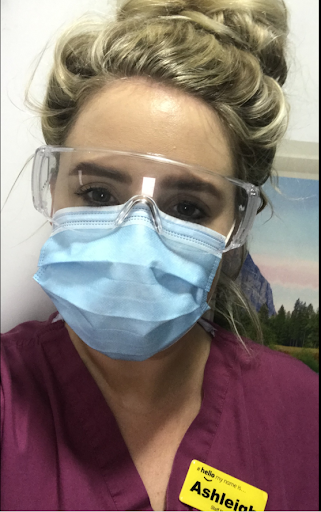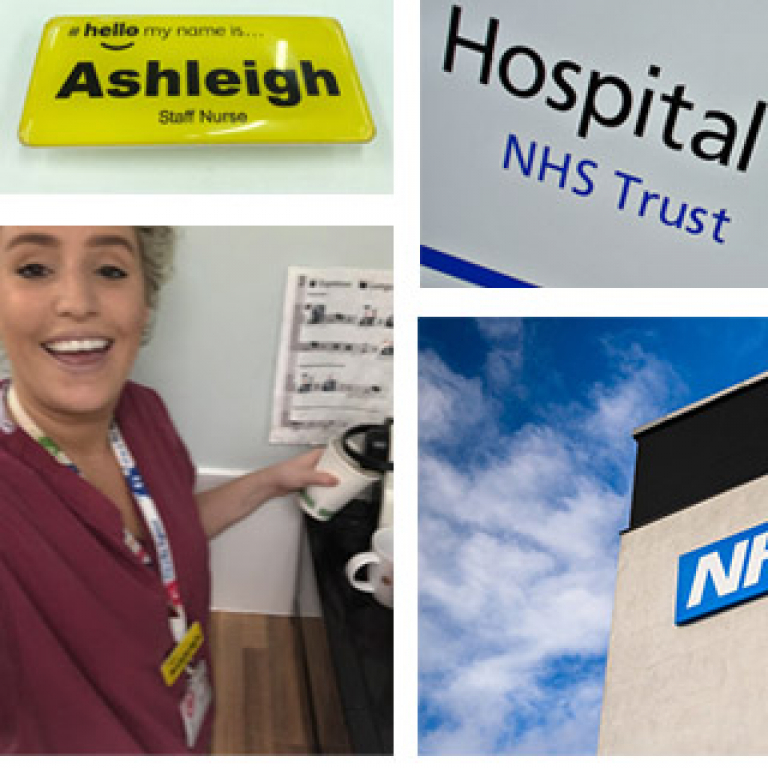Nursing in a pandemic
Ashleigh Herron is originally from Northern Ireland and worked as a full-time nurse for 6 years before moving to Healthcare Communications, joining VCCP Health in 2018. Not wanting to give up her registration, she remains a practicing nurse doing at least a shift a month which helps her stay up to date and gain valuable insights for our clients.
Well since I last wrote, in a strange turn of events we are all now making our way through a pandemic.

At the start of this turbulent time – after sleepless nights and much deliberation – I decided to do a few shifts in the hospital.
In all honesty I was terrified. But how could I ever relate to HCPs again if I didn't experience even a smidgen on what they did? My mother still doesn’t know I went into the hospital… sorry mum!
In anticipation of going into the hospital I spoke to my nurse friends regularly…which made me panic as they were living this nightmare daily. One friend told me that on her high-dependency unit they’d been told to undertake ‘war time nursing’ measures. I mean, initially in my head this sounded romantic as I envisioned bright red lipstick and pin curls in beautiful white flowy pinafores. However, this image quickly shattered as what this actually meant was she was going to be put in charge of 36 ventilated patients and the conversation turned to me having to reassure my friend she wasn't going to die and she would be able to see her family soon.
I spoke with another friend who experienced 8 deaths in one night, and another who had nursed children for her entire career now having to nurse adults in intensive care. Safe to say I was on edge. However, after my first shift I was surprised at what I learnt.
I had accepted to work on a respiratory ward. I didn't sleep a wink the night before and woke up early to pack my goggles, lunch and newly purchased crocs (only a pandemic could have made me do something so heinous). I was shocked by how eerily quiet it was. Normally there is a lot of hustle and bustle. I got my allocations and all my patients were pretty straight forward and all COVID negative (phew). The COVID positives were being nursed elsewhere on the ward, so I still had to be vigilant.
My patients were in their bay. I waved through the glass, put on my PPE and went to see them. It was interesting, this new dynamic between nurse and patient. In most cases you only went to your patient when they needed you, which is greatly reduced as some don't want to bother you and others are nervous they would contract COVID from you.
No visitors were allowed on the ward – to which any nurse reading this would probably say ‘happy days’, as visitors can be the biggest hindrance to your shift. Although what this does mean is you aren't only the patient’s nurse but also their relative, friend and confidant. This became particularly apparent when my patient, who was only 34 was given a terminal diagnoses of cancer and she could only phone her nearest and dearest but I was there physically for her during the worst moment of her life. So although it was easier physically to do the shift, the emotional side was mammoth and exhausting, very different from anything I have experienced before.
Nurses have become so much more vital in a patients stay in hospital and more than ever are advocating for their vulnerable patients as there is no relative to do it.
I have only done a few shifts and luckily I never had to deal with the extremely sick patients. When chatting with nurses on my shifts, it’s hard to comprehend what they have been through: holding up iPads for their patients so relatives can say goodbye; having to move out of their homes as they live with someone who is high risk; and in a few harrowing situations having one of their loved ones contract COVID from them. My friend is currently seeing a psychologist as she is only now realising what she has put herself through the last couple of months.
Things are starting to settle but there is going to be a massive mental health implication for HCPs who worked through the COVID pandemic, so when we are addressing HCPs I feel empathy and understanding are more important than ever. We need to sincerely acknowledge and appreciate what they have done for us and help our clients achieve too.
On a brighter note, I have noticed a real solidarity amongst all the multidisciplinary teams. This may be because we are all in the same scrubs so it is hard to identify anyone’s role, or because there is now a sense that we have worked through a pandemic and there is a mutual respect. There is a real sense of teamwork. Not to sound like an extra in high school musical, but this ‘we are all in this together’ mentality is incredible and definitely helps bring up morale. I also noticed that this shift in dynamics on the ward allows the nurses to be more autonomous and have more confidence. If there was ever a time to empower nurses it is now, in healthcare communications we should try to ride this wave and empower nurses where possible. This pandemic has allowed everyone to see how vital they are!
The importance of digital within healthcare has also become increasingly apparent. Many nurses who were redeployed from outpatient clinics to the wards told me how their set-up has changed now they are doing digital consultations. A lot of nurses I spoke to are resistant to this new digital takeover, commenting how nursing is about those ‘in person’ interactions. Of course I do agree with this but I also feel the reluctance stems from not understanding digital platforms themselves and not being confident navigating this new digital world. It is important to account for this reluctance and encourage our clients to find a creative ways to support and engage them.
There is no doubt this pandemic has changed in the healthcare industry, possibly in some cases even for the better – but I don't think we will know the true effects for a while to come. Ashleigh Herron, Senior Account Executive, VCCP Health

